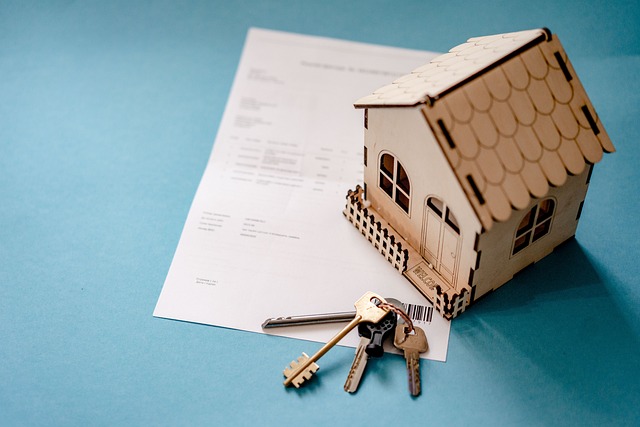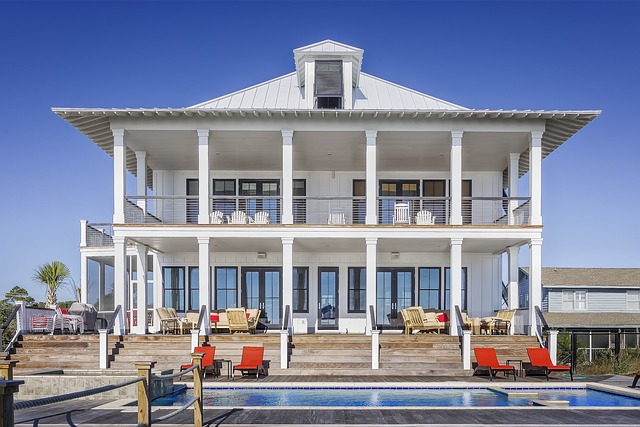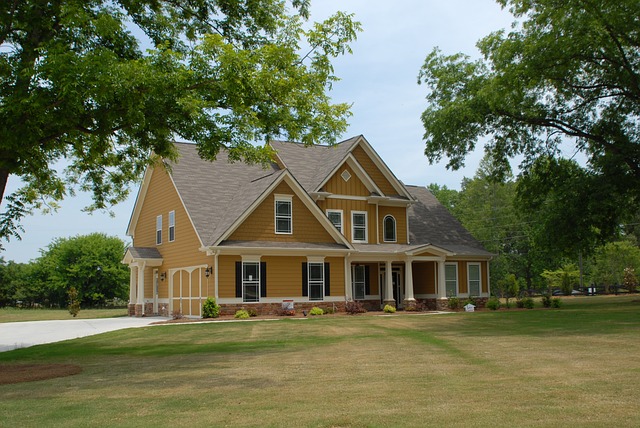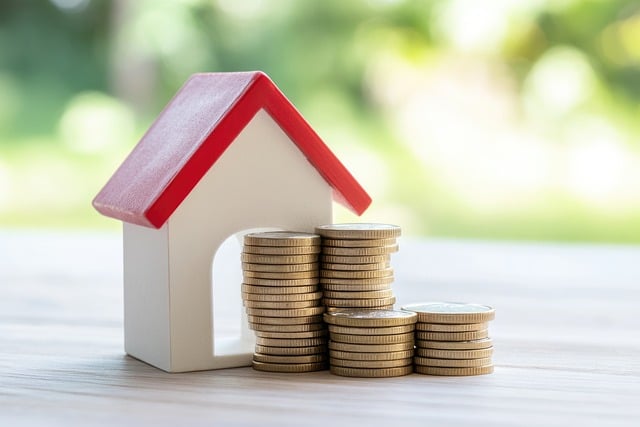When considering the purchase of an Executive Condominium (EC) resale unit in Singapore, it's crucial to understand the unique blend of public and private housing rules that govern these properties. The EC market is influenced by various factors including location, age, market trends, and economic indicators. Historical data shows that EC prices can be affected by government policies like SERS, interest rate changes, and broader economic conditions. To accurately assess an EC's value, one must consider its condition, characteristics, and comparable transactions in the vicinity. Additionally, buyers must navigate the HDB's eligibility criteria, income ceilings, and adhere to CPF usage guidelines as well as ABSD regulations. A comprehensive understanding of these factors, along with adherence to the HDB resale agreement format and legal requirements, is essential for a successful EC resale transaction.
navies the intricacies of the property market in Singapore, with a spotlight on the Executive Condominium (EC) resale prices. This comprehensive guide dissects the factors influencing EC resale value trends, from location and proximity to amenities to the impact of tenure duration. Delving into historical price movements for HDB Executive Condos offers valuable insights, complemented by expert tips on evaluating market value. Prospective buyers and sellers will find essential information on navigating legalities and documentation for EC resale transactions, ensuring a well-informed approach to this unique housing segment in Singapore’s dynamic real estate landscape.
- Understanding Executive Condominium (EC) Resale Prices in Singapore
- Factors Influencing EC Resale Price Trends
- The Role of Location and Proximity to Amenities in EC Resale Values
- Analyzing the Impact of Tenure on Resale Prices of ECs
- Historical Price Movements for HDB Executive Condominiums
- Tips for Evaluating the Market Value of an EC Resale Unit
- Navigating the Legalities and Documentation for EC Resale Transactions
Understanding Executive Condominium (EC) Resale Prices in Singapore

In Singapore, the market for Executive Condominium (EC) resale prices is a dynamic and nuanced one, influenced by various factors including location, age of the development, and the overall property landscape. Prospective buyers often seek out ECs as a housing option that offers a balance between the benefits of a condo and the affordability of public housing. Housing & Development Board (HDB) resale prices play a significant role in setting the benchmarks for EC valuation, given their similarities in terms of eligibility and intended demographic. To navigate this market effectively, it’s crucial to analyze recent transactions, consider the development’s attributes such as facilities, completion status, and proximity to amenities, as well as the broader economic indicators that affect property values.
The resale prices of ECs are also subject to changes in government policies, which can influence the supply and demand dynamics within this niche segment. For instance, upon meeting the minimum occupancy period, ECs upgrade to private condominium status, affecting their pricing and appeal. Additionally, the eligibility criteria for purchasing an EC have implications on the potential buyer pool. By understanding these factors and how they interact with market trends, investors and homeowners can make more informed decisions when considering an EC resale purchase in Singapore. Investors interested in Executive Condominium HDB resale prices should keep a close eye on both short-term fluctuations and long-term trends to capitalize on the right opportunities within this segment.
Factors Influencing EC Resale Price Trends

The resale price trends of Executive Condominiums (ECs) under the Housing & Development Board (HDB) are influenced by a confluence of factors that investors and homeowners alike must consider. The condition and age of the EC unit play a significant role; older units typically depreciate over time, but well-maintained ones can retain their value or even appreciate if located in sought-after neighborhoods. Market demand is another critical element; as population growth and economic stability increase, demand for housing may rise, driving up resale prices. The location of the EC is paramount, with proximity to amenities such as shopping centers, schools, and public transportation enhancing desirability and potentially commanding higher resale prices. Additionally, the maturity of the estate, developmental projects in the vicinity, and any changes to the policies governing ECs can impact their market value. Investors keen on understanding the resale price trends for Executive Condominiums HDB should therefore closely monitor these factors, as they are pivotal in shaping the property’s worth over time.
Furthermore, the resale price trend of Executive Condominiums (ECs) is also subject to the broader economic climate and government policies. Economic conditions such as interest rates, inflation, and employment trends can affect buyers’ purchasing power and willingness to invest. Government regulations, including eligibility criteria for ECs and changes in public housing policies, can also influence the resale market. Proximity to completed or upcoming MRT stations, as well as the quality of local schools, can significantly affect property values. In essence, a myriad of interrelated factors contributes to the fluctuation in Executive Condominium HDB resale prices, making it essential for buyers and sellers to conduct thorough research and stay informed about the latest trends and policy changes.
The Role of Location and Proximity to Amenities in EC Resale Values

When evaluating the resale prices of Executive Condominiums (ECs), a critical factor that influences their market value is the location and proximity to essential amenities. Situated at the crossroads between the luxury of a condominium and the affordability of HDB flats, ECs are a popular housing option for many Singaporeans. A prime location not only offers convenience but also adds to the desirability of these properties, which in turn can positively impact their resale values. Proximity to MRT stations, shopping centers, schools, and recreational facilities is highly sought after by potential buyers, as it ensures a comfortable lifestyle with minimal travel time. Moreover, an EC situated near well-regarded educational institutions or within a bustling commercial hub often attracts families and young professionals alike. These factors contribute to the property’s appeal, making it a valuable investment that can retain or appreciate its value over time. In the competitive landscape of real estate, particularly in Singapore’s property market, an Executive Condominium’s resale price is notably influenced by its location and accessibility to daily necessities and leisure options, reflecting the dynamic nature of real estate valuation.
Analyzing the Impact of Tenure on Resale Prices of ECs

When assessing the resale prices of Executive Condominiums (ECs) under the Housing & Development Board (HDB), it’s clear that the tenure of the EC plays a significant role in its market value. Typically, an EC reverts to regular HDB flat status after the initial 10-year minimum occupation period, which can influence its resale price. The original purchase price often reflects a premium due to the hybrid nature of these units, blending the benefits of a private condo with the subsidy and resale market eligibility of an HDB flat. As such, the remaining lease significantly impacts the EC’s resale value. ECs with longer lease years tend to command higher prices, reflecting investor confidence in their long-term appreciation potential. Buyers generally favor units with a longer balance lease, anticipating lower maintenance fees and a more stable asset, which translates into competitive resale prices. Conversely, ECs with shorter remaining leases may fetch lower prices as they approach the end of their lease where they will revert to regular HDB flats, potentially affecting their desirability and resale value. The interplay between tenure, remaining lease, and market demand thus becomes a crucial factor when evaluating the resale prices of ECs under the purview of the HDB framework.
Historical Price Movements for HDB Executive Condominiums

The resale prices for Executive Condominiums (ECs) under the purview of the Housing & Development Board (HDB) have demonstrated a dynamic trend over the years, reflecting broader market conditions and government policies. Historical price movements reveal that ECs have traditionally served as an affordable housing option for upgraders who are not immediately eligible to purchase a public flat. Prices of these units have fluctuated in response to various factors such as economic growth, interest rates, and the supply of ECs in the market. Notably, the introduction of the Selective En Bloc Redevelopment Scheme (SERS) has often led to price upliftments for affected ECs due to the enhanced desirability post-redevelopment. For instance, the resale prices of ECs in mature estates like Sengkang and Tampines have shown steady growth, driven by the completion of new infrastructure and the increasing popularity of these areas among buyers seeking a balance between affordability and accessibility. Prospective buyers and investors keen on understanding the trajectory of EC resale prices should consider the historical context, which includes factors such as timing of previous SERS announcements, changes in loan interest rates, and the overall economic climate at different periods. This historical data can provide valuable insights into potential future trends for the discerning investor or owner-occupier considering an Executive Condominium HDB resale.
Tips for Evaluating the Market Value of an EC Resale Unit

When assessing the market value of an Executive Condominium (EC) resale unit, potential buyers should consider several factors that influence pricing. The resale price of ECs, which are a hybrid of private condos and HDB flats, can be affected by various elements including location, property age, market trends, and the condition of the unit. Proximity to amenities such as shopping centers, schools, and public transportation is a significant determinant of desirability and value. Additionally, the overall state of the housing market plays a crucial role; buyers should track economic indicators and interest rate changes that can affect affordability and demand.
The age of the EC also plays a vital role in its valuation. Newer units tend to attract higher prices due to their modern amenities and potential for future resale value. On the other hand, older ECs might require renovation or maintenance, which should be factored into the purchase price. Beyond these considerations, the size and layout of the unit, as well as its unique features such as views or exclusive facilities, can also impact its market value. To make an informed decision, it’s advisable to compare similar EC resale units in the vicinity and review past transaction prices. This data can provide a realistic benchmark for pricing and help buyers navigate the property landscape with confidence.
Navigating the Legalities and Documentation for EC Resale Transactions

When considering the purchase of an Executive Condominium (EC) via a resale transaction, it is crucial to be well-versed in the legal framework and documentation requirements set forth by the Housing & Development Board (HDB) and Singapore’s CPF Board. Prospective buyers must understand that purchasing an EC on the resale market involves a unique set of rules distinct from both public housing and private property. As an integrated form of housing, ECs offer the dual benefits of being part of a public housing estate while allowing owners to sublet their units after five years, and sell them on the open market upon satisfying certain criteria, including the satisfaction of a five-year Minimum Occupation Period (MOP).
The transaction process begins with a comprehensive check of eligibility criteria. Potential buyers must meet the income ceiling set by the HDB to qualify for an EC. Additionally, they must be first-time flat owners or must have previously owned a flat but have disposed of it at least three years before the application for a new EC. The legalities also extend to the necessary documentation, which includes a resale agreement that is compliant with the HDB’s requirements and a proper check on the unit’s housing loan status. Furthermore, the CPF Board’s guidelines on the use of CPF savings for the purchase must be adhered to, ensuring that the transaction aligns with the regulations governing EC resales. Buyers should also be aware of the additional buyer’s stamp duty (ABSD) and the requirement to sign a resale agreement that reflects all terms and conditions as stipulated by the HDB. Navigating these legalities and documentations is essential for a smooth EC resale transaction, ensuring that both parties involved are protected and that the property rights are duly upheld.
In concluding our exploration of the Executive Condominium (EC) resale market in Singapore, it’s clear that discerning investors and homebuyers have a myriad of factors to consider when evaluating EC resale prices. From the influence of location and proximity to essential amenities to the impact of tenure on overall resale values, buyers must take a strategic approach. Historical price movements for HDB Executive Condominiums provide valuable insights into market trends, which are pivotal in making informed decisions. Prospective buyers must also navigate the intricacies of legal and documentation processes involved in EC resale transactions. Ultimately, understanding the dynamics of the EC resale market is essential for anyone looking to invest or purchase an EC unit. By leveraging the information presented, individuals can better assess market value and make confident, well-informed decisions regarding their Executive Condominium HDB resale property in Singapore.



